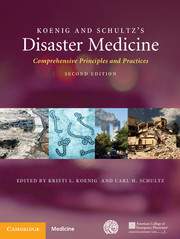Book contents
- Koenig and Schultz's Disaster MedicineSecond Edition
- Dedication
- Koenig and Schultz's Disaster Medicine
- Copyright page
- Contents
- Contributors
- Foreword
- Perspective
- Preface
- Part I Conceptual Framework and Strategic Overview
- 1 Disaster Research and Epidemiology
- 2 Disaster Health Education and Training:
- 3 Surge Capacity and Scarce Resource Allocation
- 4 Climate Change
- 5 International Perspectives on Disaster Management
- 6 Community Resilience
- 7 Ethical Issues in Disaster Medicine
- 8 Emerging Infectious Diseases:
- 9 Disaster Behavioral Health
- 10 Populations with Functional or Access Needs
- Part II Operational Issues
- Part III Clinical Management
- Index
- References
4 - Climate Change
from Part I - Conceptual Framework and Strategic Overview
Published online by Cambridge University Press: 05 April 2016
- Koenig and Schultz's Disaster MedicineSecond Edition
- Dedication
- Koenig and Schultz's Disaster Medicine
- Copyright page
- Contents
- Contributors
- Foreword
- Perspective
- Preface
- Part I Conceptual Framework and Strategic Overview
- 1 Disaster Research and Epidemiology
- 2 Disaster Health Education and Training:
- 3 Surge Capacity and Scarce Resource Allocation
- 4 Climate Change
- 5 International Perspectives on Disaster Management
- 6 Community Resilience
- 7 Ethical Issues in Disaster Medicine
- 8 Emerging Infectious Diseases:
- 9 Disaster Behavioral Health
- 10 Populations with Functional or Access Needs
- Part II Operational Issues
- Part III Clinical Management
- Index
- References
- Type
- Chapter
- Information
- Koenig and Schultz's Disaster MedicineComprehensive Principles and Practices, pp. 52 - 58Publisher: Cambridge University PressPrint publication year: 2016



